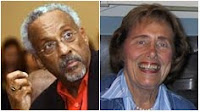This book review was orginally written for the BAodn (Bay Area OD Network) Blog and can be found here: http://baodn.blogspot.com/2010/10/must-read-surviving-baby-boomer-exodus.html
I excerpt it below for you reading convenience.
The Book
Surviving the Baby Boomer Exodus: Capturing Knowledge for Gen X and Y Employees by Ken Ball and Gina Gotsill examines the “knowledge vacuum” that is occurring in the business world as Baby Boomers retire or leave the workplace, and take with them, their soft skills an practical wisdom.
Summary
At first glance, this book appears to be about the sea-change that we’ve heard so much about in the context of social security — retiring Baby Boomers. The book then quickly takes a deep dive into the specifics of those generational differences, examines different types of knowledge, and looks at the impact on specific industries. A large part of the book outlines on what you need in order to design a program that will effectively help transfer and retain knowledge.
This book is based on both primary research — talking to people in companies who are dealing with this very issue — and well-grounded secondary research. There’s a special focus on industries such as aerospace, manufacturing, oil, gas and utilities. Some snippets that resonated with me:
- One-third the youngest boomers do not want to be known as Baby Boomers– in fact, most identify as Gen X.
- Baby Boomers like telling stories, but GenX often wants to approach Boomers in a less “adoring” manner than they would prefer.
- GenX consider themselves “free-agents”, often mentor each other, and just want to be left alone to get the job done.
- Younger generations expect exceptions — they lack patience for a “must do this way” approach to learning.
- Data with interpretation becomes information, and with context and experience becomes knowledge
- Information exchange does not equate to knowledge transfer.
In order to understand the most appropriate methodology for transferring knowledge, you must first understand your audience, and the difference between the types of knowledge. Is it explicit, implicit or tacit, and how do you know the difference? The core challenge of the Boomer Exodus is transferring tacit and implicit knowledge from boomers to younger generations.
Mentoring is one of the key strategies to knowledge transfer. In order to do this effectively, consider the audience, your metrics, and the nature of the job (e.g., sales coach vs. leadership mentoring). Supporting tools may include supply toolkits, worksheets, forums for networking, orientation and training the creating a mentoring program. It can be 1:1 mentoring, or perhaps even the creation of mentoring circles. Additional means of knowledge transfer include using social media, communities of practice, narrative storytelling, and even after-action-reviews.
Why read this book?
If you’re looking to establish a knowledge transfer program within your organization this book will help you create a process around a knowledge project. It goes through the specifics of designing, developing and implementing and nurturing a program with mentoring at the cornerstone.
If you’re looking to understand differences in generational learning preferences and the characteristics of these generations, this book provides well-researched basics in the subject. It has a textbook feel to its approach.
The authors come from an instructional design perspective and so use the ADDIE process to guide you through the creation of a program. The authors may not be “traditional” OD practitioners, but the process of creating a knowledge transfer program is OD in practice.
In general, practitioners who are faced with the challenge of an aging workforce, retirements that loom large, will find this book to be a useful, practical guide to structuring and implementing a solution.
If you’re interested in learning more, come hear Ken Ball speak with his colleague Vic Passion at an upcoming BAODN event on Oct. 27, 2010.
——————–
 As I close out a couple of existing engagements and prepare to start a new one, I am reminded of the Alice in Wonderland series, mentioned several times by Saqib Ali, a frequent commentator on this blog.
As I close out a couple of existing engagements and prepare to start a new one, I am reminded of the Alice in Wonderland series, mentioned several times by Saqib Ali, a frequent commentator on this blog. There’s an organization I volunteer for called Bay Area OD network. I joined it because I got tired of learning conversations that were always in the weeds, training that supported the status quo, and not focused at changing the organization. I’m interested in how I move people from training to learning that matters (and that’s not necessarily organizational learning.)
There’s an organization I volunteer for called Bay Area OD network. I joined it because I got tired of learning conversations that were always in the weeds, training that supported the status quo, and not focused at changing the organization. I’m interested in how I move people from training to learning that matters (and that’s not necessarily organizational learning.)